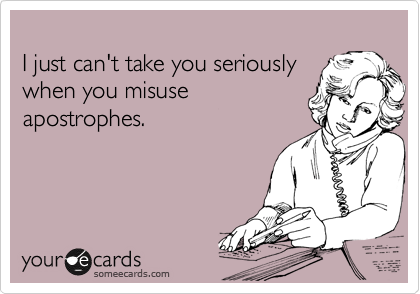I'm sure we've all had those moments where we write a word and then stare at the screen, scratching our heads and wondering, Should this word take an apostrophe? Well, maybe you haven't, but I certainly have. In fact, it's hard not to panic.
The Basics: Apostrophe S
Possessive apostrophes seem black-and-white until they're not. Some people might think, "If it's possessive, just tack an 's on there, and you're all good!" While that may be true sometimes, the English language is rarely, if ever, that simple. However, the single apostrophe sentiment usually holds true when using a proper noun. For example, you can say "Luke's lightsaber," "Frodo's ring," or "Serena's blog." In these instances, the possessive apostrophe and s work just fine.
The Basics: Just an Apostrophe
There are instances, however, where just an apostrophe is the solution. These, of course, are instances of plural possessive words. You might think, "If the word's plural, just use an apostrophe. No extra 's' is needed." And in most instances, this would be true. Easy-peasy, right? You can write phrases like "the dogs' bones," referring to bones that belong to several dogs, and you would be correct.
The Exceptions: Words That Are Already Plural
However, when a pluralized form of a word doesn't already end in the letter s, things can get muddy. How, for example, should you make the word "women" possessive? Before I explain, let's look at an example of a possessive apostrophe error:

This post, posted by user danmalluk on the subrebbit "r/britishproblems," neglects the possessive apostrophe altogether. In this instance, then, the word "womens" does not designate clothing for women. Instead, it is simply an over-pluralization (forgive my made-up word) of the word "women." The word women is already plural. Adding an extra s to it doesn't do anything but harm the word itself. So, could we fix this by tacking an apostrophe on the end? Well, no. Just as "the dogs' bones" refers to bones that belong to the dogs, saying "the womens' section" would refer to a section that belongs to the womens. Once again, we have an issue of over-pluralization. Here, the only solution is to use an 's after the word. How would we correct the Reddit post above, then? It should read, "Every clothes shop: WOMEN'S, WOMEN'S, WOMEN'S, WOMEN'S, WOMEN'S, WOMEN'S, WOMEN'S, WOMEN'S, WOMEN'S, WOMEN'S, WOMEN'S, WOMEN'S, WOMEN'S, WOMEN'S, WOMEN'S, WOMEN'S, WOMEN'S, WOMEN'S, WOMEN'S, WOMEN'S, WOMEN'S, men's." Possessive apostrophe errors? Obliterated!
The Exceptions: Personal Pronouns
There are instances, however, when having no apostrophe is, in fact, correct. These are those moments when adding an apostrophe would create an "is" contraction. For example, let's use the word "it." POP QUIZ! Which version of this sentence is correct: "Its raining outside," or "It's raining outside"? The answer? "It's raining outside." With the word "it," adding an apostrophe denotes a contraction. "It's," therefore, can only mean "it is."
In an instance of the possessive, then, what is the solution? Well, let me ask another question. Which of these sentences doesn't include an error: "The ant dropped its crumb" or "The ant dropped it's crumb"? Well, as I mentioned before, an apostrophe in the word "it" can only create the contraction "it is." The second contraction, therefore, translates to "the ant dropped it is crumb," which, I think we can all agree, doesn't make any sense.
The good news? This rule applies to almost all personal pronouns. Examples include the words his, hers, its, theirs, ours, yours, etc. Does that make sense? Just in case, let's look at another example to solidify this.
.png)
What's wrong with this sentence? In this tweet, posted by @anneqthena on the social media platform X, formerly known as Twitter, we have come across an error. The word "her" is a personal pronoun. Thus, adding an apostrophe denotes a contraction. I know, it's weird. The phrase "her is" isn't used in everyday conversation, but that's what the word "her's" means. Because of this, it's safe to say that in most, if not all, instances, using an apostrophe with the word "her" will be grammatically incorrect. How do we fix this error, then? In this case, it's super simple. Just remove the apostrophe, and everything is A-okay. The corrected tweet will read as such: "And when we see edits go from 'hers always, she's my little sister,' to 'family Luke, you promised,' then what? THEN WHAT??" Yes, I did, in fact, change a few other errors. I'm sorry; I can't help myself.
So, Why Does This Matter?
You've probably deduced from several of the previous examples that, sometimes, a misused apostrophe actually changes the meaning of a word. We end up sounding uneducated when our work is read as "the section belonging to the womens" and "the ant dropped it is crumb." Apostrophes are a vital part of English grammar; without them, sentences stop making sense. So, let me leave you with this meme from someecards.com.
Conclusion
Possessive pronouns can be weird, and they can feel rather inconsistent if you don't know the rules. Hopefully, this post has cleared a few things up for all of you. Also, don't worry if you struggle with this! It took me years to stop saying "it's" when I meant "its." When I'm being careless, this error still slips through. The key is to be patient with yourself and be sure to proofread. Good luck out there, everyone. Those possessive apostrophe errors are no match for all of you!
Until next time, everyone!
Serena Smith



.png)



